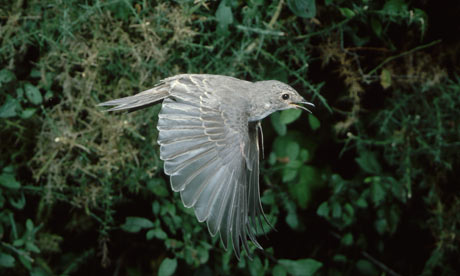
A spotted flycatcher flies past a blackberry bush
-------------
Swallows are hawking for insects in the skies overhead, a spotted flycatcher perches in a nearby bush, and in the distance, I can hear a willow warbler singing its plaintive, silvery song.
Somerset in June? No, southern Africa in February � our winter, but the end of their summer. So what are such familiar, quintessentially British, species doing so far from home?
Well, if the weather with you is anything like it was when I left back in early February, you'll know the answer. Birds that feed on insects � especially small flying insects � simply can't survive the cold European winter. So every autumn hundred of millions of them head south; some of them flying more than 10,000 kilometres to a place where they can find warmth, and most importantly, plenty of food.
As a matter of fact, their true home is here in the forests and savannahs of southern Africa, not in the woods and fields of England. These birds, which are such an integral part of the British summer, evolved here in Africa. Competition with other closely related species (I've seen half-a-dozen different kinds of swallow since I've been here) drove them northwards to the temperate regions of the northern hemisphere, where they discovered that the long summer days and plentiful supplies of insect food made for an ideal place to breed. And though it seems bizarre that they should wish to leave such a pleasant and apparently ideal place, it makes sound evolutionary sense that they do.
In a month or so, as the equinox brings equal hours of day and night, a strange urge will come over these birds. The Germans call it "zugunruhe" � migratory restlessness � and it will impel each individual bird to head north once again, on the long and often dangerous journey back to our shores.
I say dangerous, and of course many birds do perish on their return journey � killed by a predator, dying from exhaustion, or simply failing to find enough fuel to reach their destination. But migration is clearly a better strategy than staying put in one place all year round, or these birds wouldn't have survived. Indeed one noted migration expert, the Swedish scientist Thomas Alerstam, turned a familiar question on its head when he noted "We should not ask 'why do birds migrate?', when a better question would be 'why do not all birds migrate?'"
More:
http://www.guardian.co.uk/environment/blog/2009/mar/04/bird-watching-south-africa